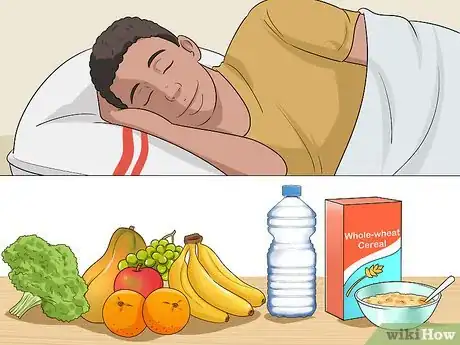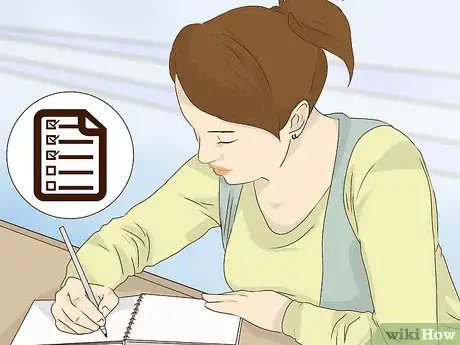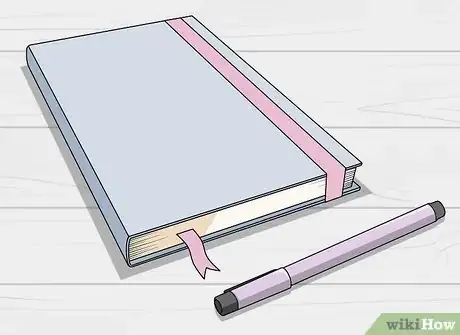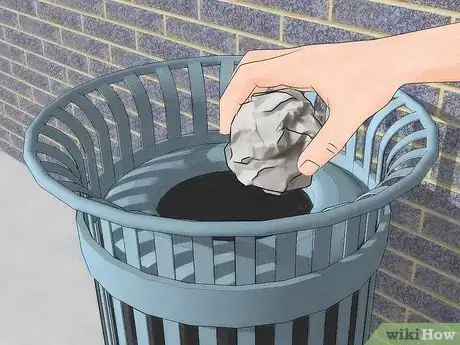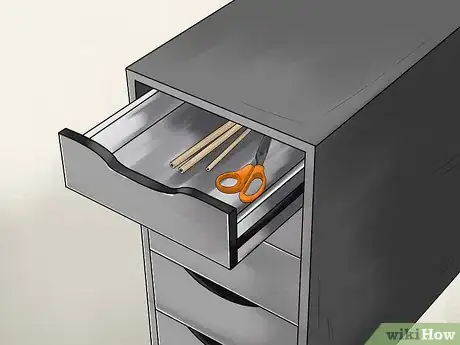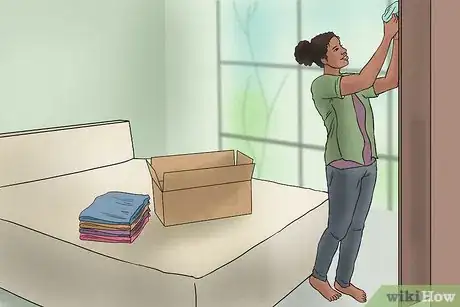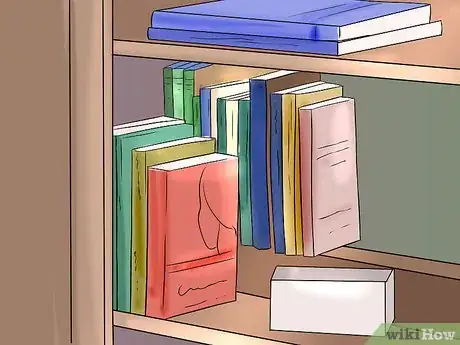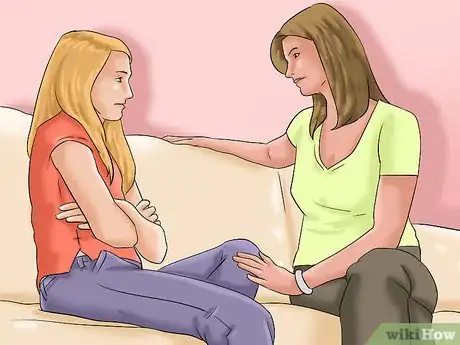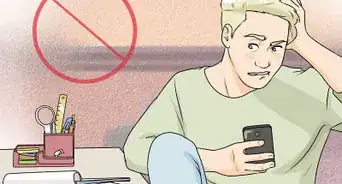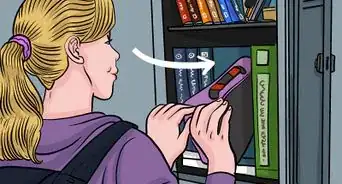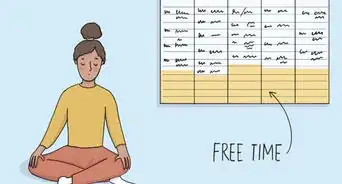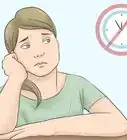This article was co-authored by Susan Pazak, PhD. Dr. Susan Pazak is a Licensed Clinical Psychologist & Professional Life Coach. With more than 21 years of experience, she specializes in treating adolescents and adults with psychological issues using cognitive behavioral therapy, symptom reduction skills, and behavior modification techniques. She has been featured in numerous media outlets and shows, including “My Strange Addiction". Dr. Pazak holds a BA in Psychology with a minor in Communications from The University of Pittsburgh, an MA in Clinical Psychology from Pepperdine University, and a PhD in Clinical Psychology from Alliant International University.
This article has been viewed 17,547 times.
Balancing school and extracurriculars can be tough. You'll catch up on your schoolwork, but forget to practice your activities. Or practice, but fall behind in your schoolwork. It happens to the best of us. If you need help balancing everything, you're in the right place!
Steps
Getting Caught Up On School
-
1Catch up on your schoolwork. If you're behind on your lessons because of your busy schedule, pick a time that you're free and dedicate that time to catching up. Pick a quiet, comfy place to catch up on your school. This is essential so that you can quickly catch up on the lessons you still have to do. Your bedroom might be a good place. Make sure your parents and siblings (and anyone else who is in your house) know not to bother you. Putting up a "Do Not Disturb" sign might help.
- If you're all caught up and still have more free time, your best option is to go ahead in your schoolwork so that you don't fall behind like you did last time. This will give you more time to focus on your activities.
- You can ask your school to start up a study club or something similar, where people who may have fallen behind can catch up with a teacher's supervision and get help from the teachers, particularly if they are studying for an important test. However, if you think you'll be distracted by talking, don't join!
-
2Check in with your parents and/or teachers. Make sure that there's no schoolwork you've missed. Try to get this done as soon as possible so that you can get up to date with your classmates.
- Sometimes, parental help can pay off. They can give you a few tips they used when they were at school.
- Your parents may have access to a website where they can check your grades and see if you are missing any schoolwork. This is why it’s a good idea to ask them as well as your teachers.
- If you still have more free time after checking in, try cleaning up your room or doing any other chores. It's good to do everything you can while you have time.
Advertisement -
3Take a break! You need to give yourself and your brain a break every so often. This will give your brain a break from work and a chance to rest.
- Schedule short breaks in between studying sessions to keep you motivated. 20 minutes at a time after 1 hour of studying, for example, is great.
- Be sure to reward yourself for all your discipline, too. For example, have your favorite food or drink. When you regularly treat yourself for hard work, it will make rigorous tasks easier.
Doing Well at Your Activities
-
1Stay healthy. You need to eat healthily, drink lots of water throughout the day, and get more sleep. Doing this will keep you healthy so that you don't get sick. This is the first step in making sure you are the best you can possibly be in your activities.
-
2Practice at home on your own. For example, if it’s piano, practice on your piano if you have one at home. If it’s a sport, buy the proper equipment or use the equipment you own at home, if you're allowed, so you can practice. This will not only help improve your skills, but it will also show your parents and activity leader(s) that you really care about getting better at the particular thing.
- This will help you complete tasks efficiently, instead of doing everything at school.
-
3Practice with your friends. If you have friends that do some of the same activities as you, try practicing with them! You can give each other feedback and do a few group exercises. Plus, it gives you a chance to fit your friends into your jam-packed schedule.
-
4Make sure that you’re always ready for your next activity. Make sure that your bag is packed with everything you'll need, and that you are dressed in appropriate clothing before you leave. You should start getting ready about 15 minutes before you have to leave, although if you know it takes longer than that, start at the appropriate time.
-
5Make sure you stay on top of your schoolwork. You've caught up, and you want to stay caught up. It is recommended to set aside at least 15 minutes a day to do schoolwork.
Managing Your Time
-
1Buy or make a planner. This will help you manage your time. You can buy planners at many different stores, or, if you want to make your own, check out this article.
-
2Write down all of your activities and assignments in your planner. Every day, you can check to see if you have anything, and if you do, you can get prepared as soon as possible.
- This is very useful for people who are juggling multiple things at once. You can't remember everything!
-
3Schedule time to do your homework. You should try and schedule them on days when you don't have any activities or when you don't have as many. Setting aside homework-dedicated time is good for efficiency.
-
4Write a weekly to-do list in your planner. It should have things you need to do for school, chores your parents have asked you to do, things you need to do in your room, and anything else you can think of.
-
5Spend your time wisely. Whenever you have a long block of free time, ask yourself, "Could I spend half of this time doing homework/cleaning/practicing?" This also means avoiding distractions; studying does not count when you spend the whole time texting or scrolling through social media.
Getting Organized
-
1Throw any trash out of your bedroom. Go through the clutter in your dresser, your desk, your closet, your backpack, empty your garbage can, and throw anything else out. Only keeping what you need will streamline efficiency (no more searching for a lost homework paper!).
-
2Clear off your desk or workspace. This helps you with schoolwork because you'll have a clear space to do school at. There are a few things you do need, but keep it down to a minimum.
-
3Go through your clothes. Get rid of any that are too small, or ones that you don't like.
-
4Clear off all of the flat spaces in your room. This includes the top of your dresser, your nightstand, and any other surfaces you have in your room.
-
5Go through your books. You might have a lot, and now is the time to get rid of some. Keep important textbooks near your workspace for easy access.
Staying Relaxed
-
1Get high-quality sleep as much as possible. When you're balancing school, activities, and family life, you might be pretty exhausted. Try going to bed half an hour -or even an hour -earlier. Explain to your parents that you're tired and ask them if they would let you sleep in a bit later on the weekends.
- It's recommended trying to avoid electronics for about an hour before bed, as the light can keep you awake.
-
2Take some time to read. You might have been reading a lot of books you were assigned for school, but now that you're all caught up on it, take some time to read a book that you want to read! You could try taking half an hour before bed to read. This is also proven to help you relax and fall asleep faster.
- You can catch up on dull school-assigned books this way.
-
3Hang out with your family. You might be rushing around from one activity to the next, but make sure you're still spending time with your family. Try having a family game night once a week, and you can also have dinner together, without any devices.
-
4Make time for your friends. If you don't have time to hang out with them, make sure you give them a call every once in a while so you can catch up. Try to see them at least once a week apart from school, to make sure your bond with them stays strong.
- Your social life shouldn't suffer. You could even study with your friends, provided that you don't turn it into a chatting session.
Expert Q&A
-
QuestionWhat if I'm in a relationship, but school is really important for me right now, and I don't have a lot of free time?
 Susan Pazak, PhDDr. Susan Pazak is a Licensed Clinical Psychologist & Professional Life Coach. With more than 21 years of experience, she specializes in treating adolescents and adults with psychological issues using cognitive behavioral therapy, symptom reduction skills, and behavior modification techniques. She has been featured in numerous media outlets and shows, including “My Strange Addiction". Dr. Pazak holds a BA in Psychology with a minor in Communications from The University of Pittsburgh, an MA in Clinical Psychology from Pepperdine University, and a PhD in Clinical Psychology from Alliant International University.
Susan Pazak, PhDDr. Susan Pazak is a Licensed Clinical Psychologist & Professional Life Coach. With more than 21 years of experience, she specializes in treating adolescents and adults with psychological issues using cognitive behavioral therapy, symptom reduction skills, and behavior modification techniques. She has been featured in numerous media outlets and shows, including “My Strange Addiction". Dr. Pazak holds a BA in Psychology with a minor in Communications from The University of Pittsburgh, an MA in Clinical Psychology from Pepperdine University, and a PhD in Clinical Psychology from Alliant International University.
Licensed Clinical Psychologist & Professional Life Coach Make the most of the time you do have! Whenever you're able to be with your significant other, prioritize activities that express emotions and encourage bonding. For example, once you see each other, work on a project, volunteer, or talk about your passions. Quality time is truly the foundation of any healthy relationship.
Make the most of the time you do have! Whenever you're able to be with your significant other, prioritize activities that express emotions and encourage bonding. For example, once you see each other, work on a project, volunteer, or talk about your passions. Quality time is truly the foundation of any healthy relationship.
Warnings
- Don't be afraid to ask for help. If you're seriously struggling to complete your homework on time (or do anything else important), ask someone for help!⧼thumbs_response⧽
- Learn to say no to some things. Your friends ask you to come over, or an opportunity arises for you to volunteer- whatever it is, don't be afraid to say no. If it's a once in a lifetime opportunity, then go for it! If you'd be able to do it next weekend, then you might want to say no.⧼thumbs_response⧽



